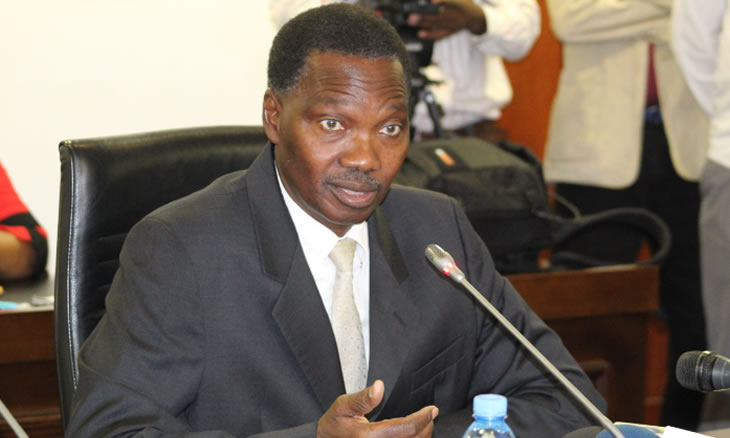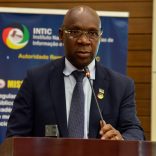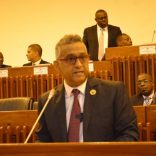Mozambique: Overtime payments will be staggered, says Minister
Central bank governor claims “consolidation of macro-economic stability”

Governor of the Bank of Mozambique, Rogerio Zandamela (in file CoM)
The Governor of the Bank of Mozambique, Rogerio Zandamela, on Friday, declared that 2018 “was marked by the consolidation of the macro-economic stability that began in 2017, after the strong measures taken by the central bank in 2016”.
At the traditional reception for the financial sector, marking the end of the economic year, Zandamela stressed that controlling inflation remained the main objective of the bank’s monetary policy, and annual inflation had fallen to less than five per cent (compared with over 26 per cent in 2016).
Based on a low inflation rate, which is expected to continue into the future, “our monetary policy in 2018 was oriented towards reducing interest rates, a factor which stimulates economic activity in general, and our small and medium enterprises in particular”.
The Bank of Mozambique reduced its key interest rate, the Interbank Money Market Rate (MIMO), five times in 2018, cutting it by 525 base points to the current level of 14.25 per cent. Zandamela said these repeated cuts were intended “to send a signal to the commercial banks that the economy is in a condition for them to reduce the interest rates on the loans they extend to their clients”.
However, companies have frequently complained that the commercial banks are slow to follow the lead of the central bank when it comes to cutting interest rates. Zandamela said the Bank of Mozambique is now working with the Mozambican Association of Banks “to continue perfecting the mechanism for determining interest rates”, following an agreement of 2017 on an “indexing factor”.
He was optimistic that the central bank’s current policy of reducing interest rates “has contributed to economic activity maintaining some dynamism, although growth of the Gross Domestic Product is still moderate and below potential”.
Zandamela noted that the return to stability in the Mozambican economy had sucked in imports. Imports in the January-September period had grown by 730 million dollars when compared with the first three quarters of 2017. Over the same period exports had only grown by 410 million dollars. Thus the deficit on the trade balance had continued to grow.
Zandamela said the Bank of Mozambique had limited its interventions on the exchange market in 2018 to correct any “excessive volatility” in the exchange rate, and to ensure the availability of foreign exchange for fuel imports.
This appears to have been successful in that throughout most of the year the exchange rate has held steady at around 60 meticais to the US dollar. The country’s international reserves, Zandamela added, have remained above three billion dollars – enough to cover seven months of imports of goods and non-factor services.
The governor admitted that, between 2015 and 2017, there were significant losses in dealings with corresponding banks abroad. This was caused by a sharp increase in the perception that Mozambique was a risk “and by the perception of business partners that the Bank of Mozambique itself was part of the problem, which put the country at a high risk of exclusion from the international payments system”.
Zandamela went into no detail – but the loss of Mozambican credibility in the period he mentioned was due largely to the scandal of the “hidden debts” inherited from the previous government led by President Armando Guebuza. Under Guebuza, three security-related companies, Ematum (Mozambique Tuna Company), Proindicus and MAM (Mozambique Asset Management), borrowed over two billion dollars from the European banks Credit Suisse and VTB of Russia, based on illegal government guarantees. The companies are bankrupt and the debt unpayable.
Zandamela added that as from 2017, “with the resumption of macro-financial stability, associated with the reforms implemented by the Bank of Mozambique and the government”, it proved possible to repair relations with the corresponding banks “in an environment of continuity of internal reforms and deepened adhesion to good international practices”.
The governor also promised to modernise the Mozambican payments system, after the huge shock of the blackout imposed by the Portuguese supplier of computer software, Bizfirst, in November. Bizfirst owned the system used by the Mozambican Interbank Company (SIMO) to which most of the commercial banks are affiliated. Following a dispute over payment, Bizfirst simply disconnected Mozambique, and no debit cards, ATMs, or point of service (POS) readers of the SIMO banks would work.
A contract has now been signed with the US company Euronet for a new computer system for interbank electronic payments.
“Our expectation is that the new provider, given its size, experience and international exposure, will offer quality services, that meet the needs of our payment system”, sad Zandamela.












Leave a Reply
Be the First to Comment!
You must be logged in to post a comment.
You must be logged in to post a comment.